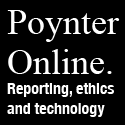• Be sure to record interviews. (Always ask first!) Don’t transcribe the interview—you don’t have time for that—but use the tape to verify your quotes. It is Clause policy that you keep files of your recorded interviews and notes as a way to defend yourself and the publication of concerns arise.
• Use quotes liberally but intelligently. Don’t quote common knowledge. Do quote a person saying something unique, saying it uniquely, or discussing what’s important.
• Quotes may also be indirect or sometimes partial. Look for colorful words that might be lifted from an otherwise lengthy or convoluted quote.
• Always attribute with the word “said,” not explained, added, says, intoned, proclaimed, whispered, sighed, wheezed, burped, gasped, sobbed, declared, exulted, or any other really cool word from your thesaurus.
• On first reference, include the person’s full name and title. On second reference, use last name only. E.g. Dr. David Dixon, assistant professor of communication, said…. Later Dixon said….
• Identify students by class rank and major. E.g. junior psychology major Shane McPherson said…
• Never write, “When asked if….” Don’t refer to you r question---just pass on the information you received. Quotes should stand on their own. Ask the source to reword or repeat for you if it sounds choppy and most often they will say it more clearly the second time around.
• Double check that names are spelled correctly. A misspelled name is an automatic sign of sloppy reporting.
• “Periods and commas always go inside quotes,” Wallace said. “Other punctuation usually does, too, but if you’re not sure, ask.”
Checklist
1. What information is needed?
2. Find appropriate interviewee
3. Assess character of interviewee (not a necessity for public officials and hard news)
4. What topics of focus will the interview include?
5. Anticipate answers
6. Be sensitive in forming questions
7. No leading questions
Why are you such an idiot?
Would you choose this or that?
8. No “yes” or “no” questions
9. The “bomb”: save the deal breaker until the end
10. Don’t be shy, ask them to repeat or explain information
11. Ask them to repeat obvious—especially specialists
12. Assume this is your last conversation
13. If something sounds controversial, ask about on and off record quotes
(don’t worry about memorizing these, it’s more important just to make the call)
Interviewing Tips
• It’s OK to be nervous. Most reporters are at least some of the time.
• Show up on time (i.e. a couple if minutes early) and dressed appropriately to the context of the interview. That is, look better when you’re interviewing the president than when you are interviewing the team captain. Always look well-groomed, wrinkle free and appropriate to the occasion. Be careful to be modest and your dress should not be distracting.
• Have several questions prepared in advance, but don’t be afraid to let the interview unfold like a good conversation.
• If you don’t understand exactly what a source means by something she has said, ask again! If you don’t get it, your audience certainly won’t.
• Let your source do the talking. You audience is interested in what he has to say, not what you can add. Be silent and listen.
• Don’t be afraid of silence. Your source will often fill the void by volunteering information, probably something you wouldn’t have learned by asking questions.
Reporter Tools
Hand-help recorder
Cellphone headset pieces
Reporter note pad
Notes
Maybe a computer
Quote check first drafts of stories
The Pub Hub
A Resource for Student Publication Workshop
Welcome to the Pub Hub
On your semester long quest to become professional reporters, editors or photographers, this site provides easily accessible tools of the trade. Confused about film reviews, need a refresher on leads, or looking for writing samples, it's all here, along with class documents (just in a case they get lost).

